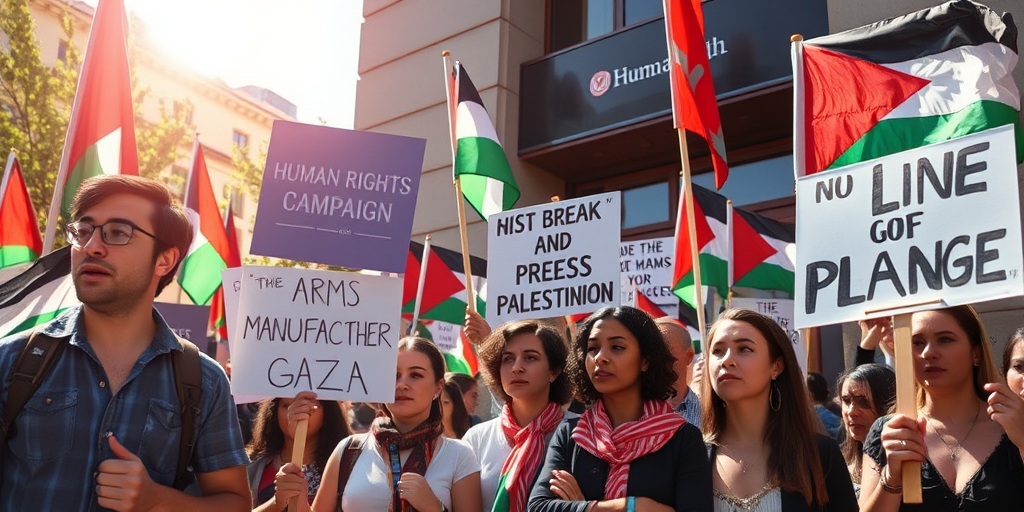Human Rights Campaign Severs Ties with Northrop Grumman Amidst Activist Pressure
The Human Rights Campaign (HRC), a prominent LGBTQ+ advocacy organization in the United States, has severed its sponsorship ties with Northrop Grumman, a leading arms manufacturer. This change comes after two years of mounting pressure from activists concerned with the apparent contradiction between promoting human rights and maintaining alliances with companies involved in global conflict weaponry.
Decision Driven by Activist Pressure
For two years, activists highlighted the conflicting partnership between the HRC’s mission of equality and the activities of Northrop Grumman, whose products have been deployed in numerous global conflicts, including in Gaza. The discord grew during Israel’s military operations there, intensifying public and internal criticism.
“Northrop Grumman’s involvement in global conflicts puts the very principles of human rights and dignity at risk. Such relationships between advocacy organizations and arms manufacturers are concerning,” exclaimed Linda Garza, a local activist involved in protests against the sponsorship.
Aligning Corporate Partnerships with Advocacy Goals
Previously listed as a “Platinum Partner,” the highest sponsorship level within the HRC, Northrop Grumman’s involvement has officially ended. By emphasizing that their current partners are committed to equality, HRC indicates a discernible shift toward aligning its sponsorships with its advocacy objectives. This development embodies a broader demand for transparency and ethical alignment among social advocacy groups, particularly against the backdrop of “pinkwashing” accusations, where companies use LGBTQ+ advocacy as a veil for controversial business practices.
The HRC has also faced past critiques for aligning with centrist political figures and actions perceived as exclusionary within the LGBTQ+ community, illustrating deeper issues about its representation strategies.
Impact on the LGBTQ+ Community
This news resonates deeply within the LGBTQ+ community in the U.S., signaling a move towards advocacy organizations reflecting the values of those they represent. It serves as a testament to the power of activism and community advocacy in holding organizations accountable.
“HRC’s decision is a step towards ensuring that policies and partnerships reflect our community’s values. It reinforces the integrity of our movement,” said Sarah Thompson, a local community organizer.
The decision aligns with a broader societal demand for reconciliation between advocacy funding and mission statements. It also highlights a complex intersection of politics, advocacy, and ethics, as HRC maneuvers through internal and external expectations in a rapidly changing societal landscape.
Repercussions for Future Sponsorships
In the fallout of this decision, other organizations and advocacy groups are prompted to scrutinize their sponsorships and affiliations. The situation can serve as a catalyst for broader change across social advocacy organizations nationally, as well-known groups might reassess partnerships to align more appropriately with their missions.
Local advocacy groups, such as the LGBTQ+ Center in Washington, D.C., also contemplate reevaluating their alliances. “An intentional analysis of sponsorships ensures that we represent and support the voices within our community genuinely,” commented Emily Maher, Director of Programs at the LGBTQ+ Center.
What’s Next for HRC and the Broader Community
HRC’s separation from Northrop Grumman implants a precedent for how advocacy strategies may evolve in response to public scrutiny and activism. While the HRC continues to advocate for the community, aligning partnerships with its mission might drive improvements in how agendas are executed.
Future implications could include broadening discussions about funding ethics across advocacy groups, ultimately promoting more substantial ethical consistency and coalition-building among organizations.
For community members seeking involvement or information on related efforts, resources are available through community organizing bodies like local LGBTQ+ resource centers and online platforms dedicated to activism. These entities provide educational materials and guidance for those interested in contributing to ongoing advocacy efforts.
In culmination, the cessation of HRC’s partnership with Northrop Grumman stands as a transformative moment within LGBTQ+ advocacy, fostering dialogue on authenticity and transparency in organizational operations. Through these changes, community interest remains elevated, reinforcing Woke news narratives aimed at fairness and aligned values in advocacy.







